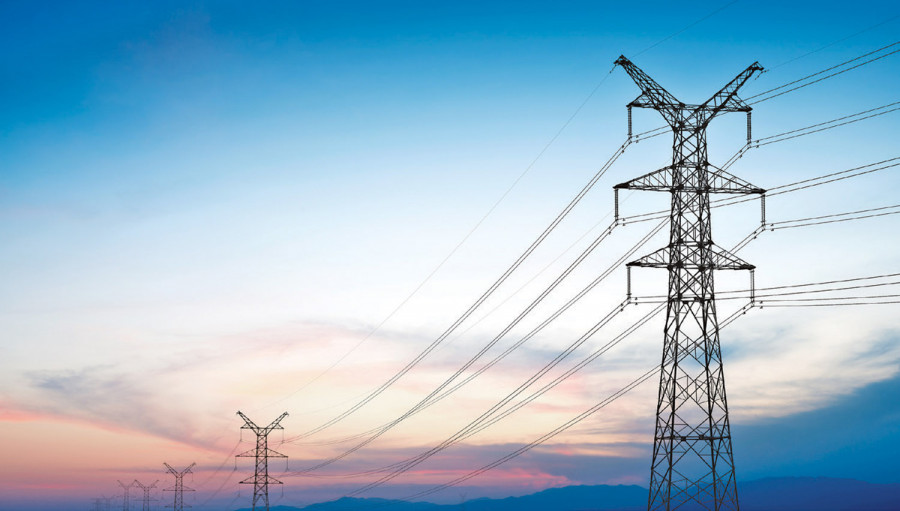
The Nepal Electricity Authority has scrapped its plan to sell 200MW of electricity to India under a long-term power purchase agreement.
Citing legal complications after one of the bidders quoted “unsatisfactory” prices, the state-owned power utility was mulling over abandoning its plan to sell electricity under a five-month-long power purchase agreement (PPA).
In early May, the NEA had invited bids from Indian companies to sell a total of 200MW for five months. As per the plan, it would sell electricity from July 1 to November 29, as part of a strategy to diversify risks because of volatile prices in the Indian Energy Exchange Limited (IEX), an electronic power trading platform.
The entire bidding process has been scrapped now. The power utility has published a notice to this effect on its website. The bidders are requested to submit their official letters for the return of the respective Earnest Money Deposits (EMD), reads the notice published on June 27.
“It is certain that we will not sell electricity under that earlier agreement,” said Kul Man Ghising, managing director of the NEA. “While the bids received were legally conflicting, we are already getting higher prices for our electricity in the IEX, so we reached a conclusion to drop the entire plan of selling power under the five-month-long plan.”
The move comes just days ahead of the NEA’s plan to start selling power to India under a long-term agreement.
The Post reported earlier this month that the power utility was in a fix over selling electricity after one of the Indian companies made two separate bids.
Manikaran Power Limited quoted INR4.86 (Rs7.77) per unit for 100MW, the highest rate offered by any bidder, and INR3.68 (Rs5.88) per unit, for another 100MW, the fifth highest among the total of six bids received.
A senior NEA official told the Post that Manikaran quoted two separate rates at the same time and this was in breach of the bidding conditions.
The second highest bidder for Nepal’s power is NTPC Vidyut Vyapar Nigam Limited, which quoted INR4.3 (Rs6.88) per unit, according to the details received by the Post.
“Manikaran quoted the highest price, but only for half of the energy on offer,” the NEA official said. “The second highest bidder has made a bid for the entire 200MW, but quoted a lower price which created difficulty in taking a decision.”
After receiving the bids, the NEA had formed a task force which had also recommended scrapping the entire bidding process, according to Ghising.
As per the details made available to the Post by a reliable source, Arunachal Power Co Limited sought to purchase 80MW at INR 4.21 per unit, PTC Limited quoted INR 4.14 per unit for 200MW, Tata Power Trading Co Ltd quoted INR 3.42 per unit for 50MW, and Kreate Power Limited has quoted INR 3.91 per unit for 100MW.
“Actually we are getting much better prices at IEX,” said Ghising.
The NEA sees the possibility of limited income from remaining 164MW out of 364MW after selling 200MW through long-term contracts whose price will be lower than what NEA is currently getting at IEX.
“We are okay with selling power at IEX,” said Ghising.
The NEA is seeking India’s approval for exporting power from more hydropower projects of Nepal, including the 456MW Upper Tamakoshi Hydropower Project. The country entered into the phase of excess power availability in the monsoon after the Upper Tamakoshi project started producing power in July last year.
Officials at the NEA said that they were expecting higher bids from the Indian companies considering the energy crisis that has gripped the world, including India.
According to the NEA, it sold its electricity in the IEX’s day-ahead-market at an average market clearing price of INR 3.79 per unit on Thursday. The maximum price the NEA received was INR 8.50 per unit while lowest was INR1.99 per unit.
In the day-ahead market, prices for another day are determined a day ahead through bidding.
The NEA has been selling a maximum of 364MW in the day-ahead market of the IEX since early June after getting approval from the Indian authorities.
Manikaran has already expressed its dissatisfaction over NEA’s argument that the former’s bids are not valid.
Anshul Rustagi, assistant general manager of Manikaran, told the Post on June 7 that nowhere in the bidding document is there the provision that says one company is barred from making two separate bids.
“As per the bid document, a company can submit a bid to buy at least 50MW of electricity,” he said. “In line with the bidding conditions, we have offered the same prices for electricity from July to November.”
He said that Manikaran made two separate bids to fulfil the demands from two separate groups of consumers who wanted to pay different prices for the electricity. He also suggested that cancelling the bidding process would raise questions about the credibility of the NEA.
A senior lawyer, however, said NEA’s decision to scrap the bidding process does not violate any law.
Gandhi Pandit, a senior advocate, said that the NEA has the right to scrap tender anytime until the bid is accepted.
“It is within the prerogative of the NEA whether to go ahead with the existing tender process or call it off,” Pandit told the Post.
The NEA aimed to diversify risk by selling power under a long-term contract as well as the day-ahead market because there is no guarantee about selling all the excess power and there is no guarantee of getting good prices all the time.
“Had the current bidding process concluded successfully, it would have given a good message about Nepal to Indian buyers because it is the first effort by the NEA to sell power under a long-term contract,” said Ashish Garg, vice-president of Independent Power Producers’ Association of Nepal, a grouping of private sector power developers.
“No matter what the reason is, the NEA seems to have reached its conclusion to scrap the bidding process. But the power utility needs to diversify its risks by selling power at both day-ahead markets and through a long-term contract.”
Currently, Nepal has the installed capacity of 2,200MW and most of the projects are running at their full capacity, according to NEA. The country’s peak hour power demand on Thursday stood at 1,660MW.
“Based on availability of power in the country, we have been exporting a maximum of 364MW… sometimes it could be less though,” said Suresh Bhattarai, spokesperson for the NEA.













